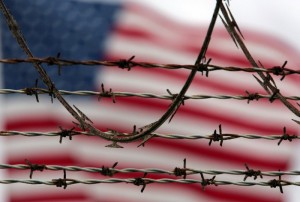If You Can be Dismembered Without Due Process, What’s a Little Detention?
The National Defense Authorization Act is probably something you never heard of before the last few weeks of 2011, even though some iteration or other of this federal law has been enacted every year for the past 49 years. Right as Advent 2011 was starting, the Act (full name: National Defense Authorization Act for Fiscal Year 2012, hereinafter NDAA) was passed by Congress and subsequently signed into law on December 31 by President Obama. It specifies the budget and expenditures of the Department of Defense for the coming year.
So why the brouhaha over it in 2011, 2012, and again when NDAA 2014 was passed by both the House and Senate, then signed into law by President Barack Obama on December 26, 2013?
Because in amongst salary for servicemen and women, and dollars for large metal things that explode and the larger metal things that tote them around, was a provision for dealing expediently with those on American soil who threaten our national security.
Now you might have thought that we already have legal provisions to deal with such persons. And we do. But such legal provisions are often inconvenient for the government because they come with certain legal, constitutional restrictions on the government’s power. Things like the requirement that detainees be charged with a crime and be given a legal hearing before a judge and have legal counsel.
The Bush administration found these requirements too onerous to apply to “combatants” and “terrorists” picked up in the field of battle overseas and that is why some men have been held for years in Guantanamo without yet having had a hearing. Remember all that discussion during the Bush years about whether “enemy combatants” who were foreign nationals were “entitled to the same constitutional protections as American citizens”? Remember the shellacking Obama gave Bush over those due process issues? Before he became president, that is.
Well here is a novel way to get rid of the question of whether foreign nationals picked up in the field of battle are “entitled to the same constitutional protections as American citizens” – just get rid of those pesky constitutional protections of American citizens! How? Simply declare that the field of battle now encompasses the entire country. Then give the government the right to hold anyone, citizen or not, in indefinite detention. The NDAA Sections 1021 & 1022 allows the president to authorize the military to arrest and hold you – American citizen — indefinitely in a military facility without charges. This year’s (NDAA 2014) bill ups the ante with Section 1071 that expands on the scope of surveillance established by the Patriot Act and the Authorization for the Use of Military Force (AUMF).
I would like to bring your attention to the remarks in this video of Douglas Macgregor (Retired) US Army Colonel that begin at 3:15: “Whenever you suspend due process, which in effect suspends the rule of law, you walk down a very dangerous path…. What worries me is that we will end up creating categories of people who are then subject to arbitrary arrest….”
While I am more than sympathetic to the outrage over NDAA 2013 and fully applaud the efforts of Ron Paul to nullify the odious provisions in it, efforts he continued regarding NDAA 2014, I think all of the wailing over the loss of due process is misplaced. NDAA did not suddenly strip Americans of their due process rights in 2012, Roe v Wade did nearly four decades ago.
Precedent is not the Issue; Principle is
Let me take you back a moment to the confirmation hearings for justices Roberts and Scalia: Recall how much was made of the concept of stare decisis i.e. that courts should generally abide by precedents and not disturb settled matters. A proper respect for the legal principle of stare decisis was demanded of George W. Bush’s appointees to the Supreme Court and we all know what that really was questioning not in so many words: Will you respect the precedent of Roe v Wade and not be complicit in overturning it?
This is what comes of allowing the culture of death to control the conversation about the law. We gradually lose even the language we need to properly address the realities under which we are living. Instead of focusing on the question of precedence, it would have been much more instructive to have focused the attention of the American people on the legal principle/s that undergirded Roe v Wade.
Even when we try to talk about the foundations of Roe v Wade, we find ourselves stuck in a very odd place — questioning a right to privacy, a right we all really think exists but that is stigmatized by its association with another notorious decision Griswold v. Connecticut, which found laws banning the selling of contraceptives to be a violation of the “right to marital privacy.” We all think there is some “right to privacy” regardless of how “penumbral” it might be to the Constitution. Do we have the “right” to use our privacy to commit a moral wrong? That depends on if we are talking about moral rights or legal rights, doesn’t it? No one can claim a moral right to do wrong. But can we even imagine what kind of system we would live under where every moral wrong, regardless of how private, was the subject of some legal sanction? It would be Panopticon with mind-reading power thrown in for good measure.
Trying to untangle Roe v Wade by picking up the thread of privacy and trailing it back to Griswold is an effort in futility that loses arguments, hearts, and minds. But talking “due process” — there we have both currency and interest.
Can I use my right to privacy to deprive you of your money? No. We call that extortion. What about depriving you of your possessions? No. We call that theft or robbery. What about your liberty? No. We call that kidnapping or unlawful confinement. What about your life? No. We call that murder.
 But that is exactly what Roe v Wade did — it established in law the principle that some human persons could be deprived of life without due process. And don’t let anyone tell you that the Constitution says nothing about unborn human persons. Who do you think the “posterity” mentioned in the preamble are if not human persons yet to be born?
But that is exactly what Roe v Wade did — it established in law the principle that some human persons could be deprived of life without due process. And don’t let anyone tell you that the Constitution says nothing about unborn human persons. Who do you think the “posterity” mentioned in the preamble are if not human persons yet to be born?
It is Roe v Wade not NDAA that stripped away the protections of the Constitution from some Americans by allowing someone to deprive them of life without due process. Once you have created categories of people who are subject to arbitrary killing, how difficult is it to create categories of people who are subject to arbitrary arrest? Apparently it is very easy. Like Douglas Macgregor said, “Whenever you suspend due process, which in effect suspends the rule of law, you walk down a very dangerous path.” Well, we have not had the rule of law in this country since January 22, 1973, because that is when it was decided that due process could be suspended and some persons arbitrarily killed.
Now that claim — that the rule of law was overturned when due process was denied — is a very strong claim. But let’s think it through a moment. Is there an occasion when a person may lawfully be deprived of his or her property, or liberty, or even life? Yes, there is. A person can, for instance, be arrested and detained. A person can have his or her goods confiscated. But the justification for this is never “private.” A person can be lawfully detained only by duly-constituted public authority, such as the police. Or have his or her goods confiscated as a result of a legal judgment and again by persons deputized to administer the court’s order. But that is only half of the equation so to speak. The “due process” does not merely restrict who may deprive a person of his or her goods, liberty, or life. It forces those who are duly authorized to take such action to follow a certain legal procedure.
Let’s assume for a moment that a mother and a doctor were even duly authorized under the law to take the life of an unborn child. That would not constitute due process. Due process exists specifically to protect the person — his goods, his liberty and his life — from those who are duly authorized. Due process is designed to protect the weaker from the stronger, the powerless from the powerful, the citizen from the government, by demanding that any deprivation of God-given rights is with cause. A cause ascertained through due process.
Due process is absolutely necessary for consent of the governed, because what constitutes cause, and the methods of deprivation — fines, imprisonment, death penalty — are established by those who must run the risk of the deprivation if they run afoul of the law. That is to say, we self-governing people make our laws and we set the penalties for breaking them and we establish by law the process by which we may be deprived of our goods, liberty, or life.
Without those due process restrictions, we live under the arbitrary rule of man, not the rule of law. In signing NDAA, President Obama assured Americans that he would not make use of this power of indefinite detention, affirming thereby that we have our liberty, not under law, but at his discretion!
But what about the unborn who cannot participate yet in the government? What about those who are mentally handicapped and will never have the capacity to participate? That is where the default position of our human rights must be invoked — rights come from God and they are natural, inherent, in human beings. The entire purpose of government is the protection of those rights, especially the protection of those rights for those who cannot participate in self-government. The default position is possession of the right. Deprivation can only be legally accomplished for those who have established through self-government the authority and the process by which that deprivation may be accomplished. Only a duly authorized agent of the government can deprive you of your goods, liberty, or life AND only by proving cause. Where no proof of cause is possible, deprivation is enjoined.
This is why the “rape exception” is so insidious to our legal system. Once again, it has to do with the principle. If Roe v Wade established the legal principle that a person may be deprived of life without due process, the “rape exception” goes even further by establishing the legal principle that the innocent may be put to death for someone else’s crime.
And now we wonder that we have in place a law that can result in the indefinite detention of a person who may have innocently, accidentally, associated with someone else who commits a terrorist act?
NDAA 2012, 2013, and 2014 are direct descendants in princple of Roe v Wade. It has finally become clear how abortion threatens the liberty of all.


